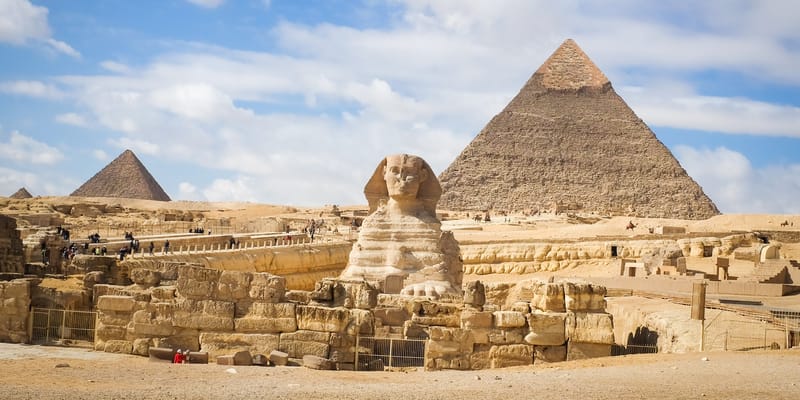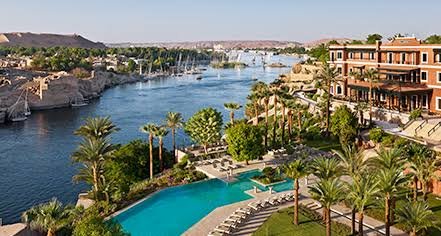About Egypt


officially the Arab Republic of Egypt, is a country in the northeast corner of Africa, whose territory in the Sinai Peninsula extends beyond the continental boundary with Asia, as traditionally defined. Egypt is bordered by the Gaza Strip and Israel to the northeast, the Gulf of Aqaba and the Red Sea to the east, Sudan to the south, Libya to the west, and the Mediterranean Sea to the north. Across the Gulf of Aqaba lies Jordan, across the Red Sea lies Saudi Arabia, and across the Mediterranean lie Greece, Turkey and Cyprus, although none share a land border with Egypt.
Egypt has one of the longest histories of any country, tracing its heritage back to the 6th–4th millennia BCE. Considered a cradle of civilisation, Ancient Egypt saw some of the earliest developments of writing, agriculture, urbanisation, organised religion and central government.[12] Iconic monuments such as the Giza Necropolis and its Great Sphinx, as well the ruins of Memphis, Thebes, Karnak, and the Valley of the Kings, reflect this legacy and remain a significant focus of scientific and popular interest. Egypt's long and rich cultural heritage is an integral part of its national identity, which has endured, and often assimilated, various foreign influences, including Greek, Persian, Roman, Arab, Ottoman Turkish, and Nubian. Egypt was an early and important centre of Christianity, but was largely Islamised in the seventh century and remains a predominantly Muslim country, albeit with a significant Christian minority.
From the 16th to the beginning of the 20th century, Egypt was ruled by foreign imperial powers: The Ottoman Empire and the British Empire. Modern Egypt dates back to 1922, when it gained nominal independence from the British Empire as a monarchy. However, British military occupation of Egypt continued, and many Egyptians believed that the monarchy was an instrument of British colonialism. Following the 1952 revolution, Egypt expelled British soldiers and bureaucrats and ended British occupation, nationalized the British-held Suez Canal, exiled King Farouk and his family, and declared itself a republic. In 1958 it merged with Syria to form the United Arab Republic, which dissolved in 1961. Throughout the second half of the 20th century, Egypt endured social and religious strife and political instability, fighting several armed conflicts with Israelin 1948, 1956, 1967 and 1973, and occupying the Gaza Strip intermittently until 1967. In 1978, Egypt signed the Camp David Accords, officially withdrawing from the Gaza Strip and recognising Israel. The country continues to face challenges, from political unrest, including the recent 2011 revolution and its aftermath, to terrorism and economic underdevelopment. Egypt's current government is a semi-presidential republicheaded by President Abdel Fattah el-Sisi, which has been described by a number of watchdogs as authoritarian.
Islam is the official religion of Egypt and Arabic is its official language.[13] With over 95 million inhabitants, Egypt is the most populous country in North Africa, the Middle East, and the Arab world, the third-most populous in Africa (after Nigeria and Ethiopia), and the fifteenth-most populous in the world. The great majority of its people live near the banks of the NileRiver, an area of about 40,000 square kilometres (15,000 sq mi), where the only arable land is found. The large regions of the Sahara desert, which constitute most of Egypt's territory, are sparsely inhabited. About half of Egypt's residents live in urban areas, with most spread across the densely populated centres of greater Cairo, Alexandria and other major cities in the Nile Delta.
The sovereign state of Egypt is considered to be a regional power in North Africa, the Middle East and the Muslim world, and a middle power worldwide.[14]Egypt's economy is one of the largest and most diversified in the Middle East, and is projected to become one of the largest in the world in the 21st century. In 2016, Egypt overtook South Africa and became Africa's second largest economy (after Nigeria).[15][16] Egypt is a founding member of the United Nations, Non-Aligned Movement, Arab League, African Union, and Organisation of Islamic Cooperation.
Egypt has an unusually hot, sunny and dry climate. Average high temperatures are high in the north but very to extremely high in the rest of the country during summer. The cooler Mediterranean winds consistently blow over the northern sea coast, which helps to get more moderated temperatures, especially at the height of the summertime. The Khamaseen is a hot, dry wind that originates from the vast deserts in the south and blows in the spring or in the early summer. It brings scorching sand and dust particles, and usually brings daytime temperatures over 40 °C (104 °F) and sometimes over 50 °C (122 °F) in the interior, while the relative humidity can drop to 5% or even less. The absolute highest temperatures in Egypt occur when the Khamaseen blows. The weather is always sunny and clear in Egypt, especially in cities such as Aswan, Luxor and Asyut. It is one of the least cloudy and least rainy regions on Earth.
Prior to the construction of the Aswan Dam, the Nile flooded annually (colloquially The Gift of the Nile) replenishing Egypt's soil. This gave Egypt a consistent harvest throughout the years.
The potential rise in sea levels due to global warmingcould threaten Egypt's densely populated coastal strip and have grave consequences for the country's economy, agriculture and industry. Combined with growing demographic pressures, a significant rise in sea levels could turn millions of Egyptians into environmental refugees by the end of the 21st century, according to some climate experts.




